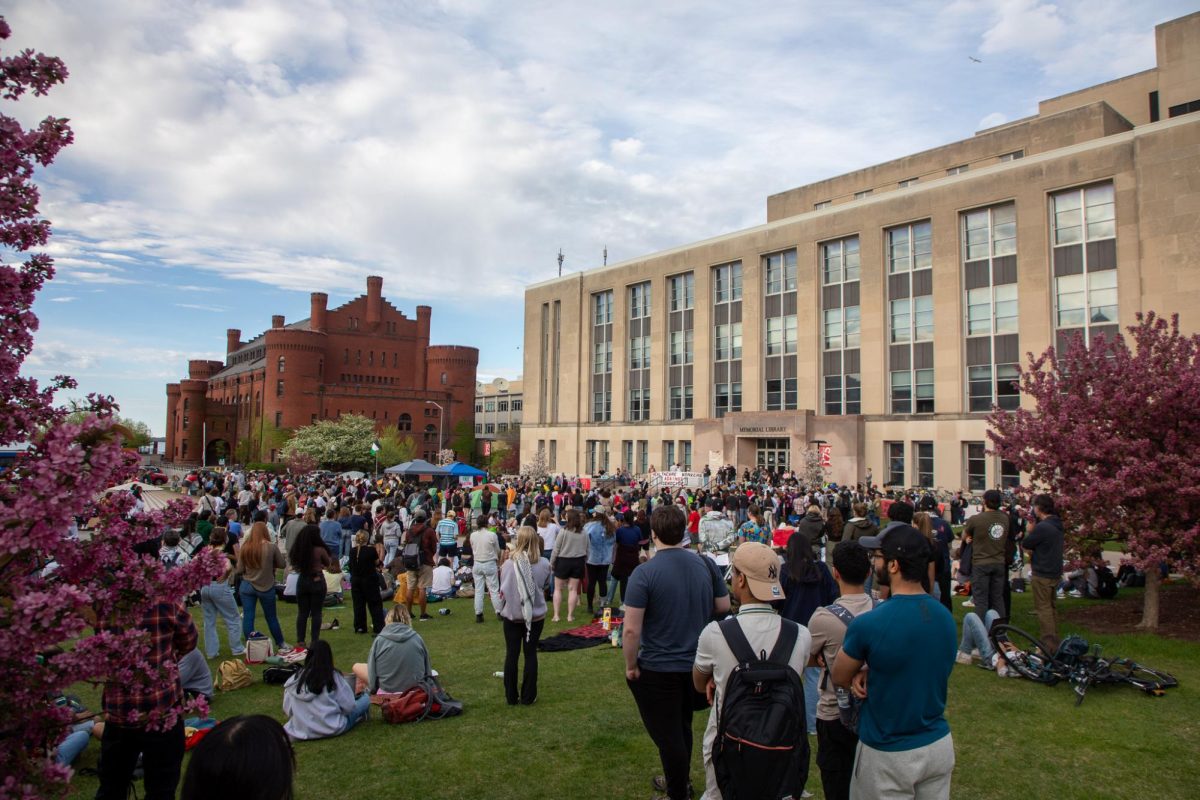Environmental advocacy groups are petitioning the U.S. Forest Service to suspend a logging project in Northeastern Wisconsin, according to a petition letter from the Environmental Law and Policy center.
The project, known as the Fourmile Vegetation Project, would clear nearly 12,000 acres of mature forest in the Chequamegon-Nicolet National Forest, according to a report from the USDA Forest Service.
The logging project in the state’s Northwoods has been on pause due to required environmental reviews conducted by the Forest Service. Now, the Environmental Law and Policy Center and 28 other organizations are trying to shut the Fourmile Project down permanently.
Proponents of the project, like Great Lakes Timber Professionals Association Executive Director Henry Schienebeck, argue the project is in line with the Forest Service’s data and management plans, according to an interview with Wisconsin Public Radio.
Rebecca M. Blank Center for Campus History holds inaugural reception
But, the mature forests under threat from the logging project need to be saved. Older forests can store much more carbon than younger trees according to a 2017 study from the University of Hamburg — highlighting the importance of preserving the relatively small areas of old-growth and mature forests left in the U.S.
Further, according to a study from Frontiers in Forests and Global Change, mature forests “support exceptional levels of biodiversity but have declined substantially from logging and development.”
The U.S. Forest Service expects around 80% of the timber harvested from the project will be used for pulp, according to a press release from the Environmental Law and Policy Center. At the time of project approval, the pulp market was at a relatively low point. Yet now in 2023, pulp prices are at an all-time high in nominal terms, according to Fastmarket, a website providing commodity price data.
It is easy to conclude that there exists a concerning level of accommodation the Forest Service provides for industry, despite the glaringly obvious ecological interest to abandon the project and preserve thousands of acres of mature forest. When pulp prices shoot up, so too does industry resistance in response to environmental advocacy.
For many, the U.S. Forest Service often has a reputation as a benevolent protector and manager of federal forests. But, only 24% of forests managed by the Forest Service and its counterpart, the Bureau of Land Management, are fully protected from logging and other means of resource extraction according to Mongabay. This means, for the vast majority of federal forests, timber rights go to the highest bidder according to the USDA Forest Service website.
Trump issued an executive order in 2017 that reversed an Obama era rule requiring evaluation of climate impacts of major federal actions. During the Trump administration the U.S. Forest Service enacted a policy that allowed for the logging of old growth and mature forests, but the policy was struck down in early September by a federal judge, halting a similar project in the Pacific Northwest, according to an article from PBS News Hour.
Chancellor Mnookin releases statement on Israel-Hamas war following responses on campus
In the petition letter to stop the Fourmile Project, critics emphasized the proposed area of the project “has among the highest amount of mature forest” in the U.S. Forest Service’s eastern region. In short, this area of the Chequamegon-Nicolet National Forest holds vital ecological importance. Following through on the logging project raises concern over long-term conservation efforts and questions the authenticity of the Biden administration’s commitment to “tackle the climate crisis.”
Beyond the potential ecological impacts of the Fourmile Vegetation Project, serious negative cultural impacts to the state’s Indigenous communities must also be taken into consideration.
The proposed site is home to the state-endangered American marten, according to the University of Wisconsin Forest and Wildlife Ecology Pauli Lab. The marten holds irreplaceable cultural significance to the Ojibwe people of northeast Wisconsin who view the marten as a totem animal according to the Gikinoo’wizhiwe Onji Waaban Initiative website. Within Ojibwe culture, the marten is highly respected for its courage and hunting prowess.
The longevity of this cultural symbol is now under threat. According to the letter sent to the U.S. Forest Service by environmental advocacy groups, the proposed area of the Fourmile Vegetation Plan will destroy about 41% of the marten’s habitat in northern Wisconsin, encompassing a large portion of the already designated Marten Protection Area.
‘Universities of Wisconsin’ rebrand extravagant amidst budget cuts
But under existing laws, the Forest Service holds government-to-government consultations with Indigenous nations concerning policies affecting them., according to the USDA Forest Service website.
According to its mission statement, the U.S. Forest Service exists to “sustain the health, diversity, and productivity of the nation’s forests …” It’s difficult to read an interpretation of this mission that is congruent with the Fourmile Vegetation Project’s plan to log thousands of acres of mature-growth forest. Any kind of reference to Indigenous nations who have been, and continue to be, stewards of the forests of Turtle Island long before the U.S. Forest Service is also suspiciously absent.
The science isn’t complicated, nor are the ethics. Cutting down this section of trees in northeastern Wisconsin, even if replanting new trees, will result in the loss of an irreplaceable ecosystem and a tremendous cultural blow to the Ojibwe people. The U.S. Forest Service needs to balance ecological, Indigenous, recreational and economic interests — right now, it has a long way to go.
Jack Rogers ([email protected]) is a sophomore studying Chinese and economics.
Editors Note: This article was updated to accurately reflect the kind of policy changes that came after a Trump-era executive order.





















